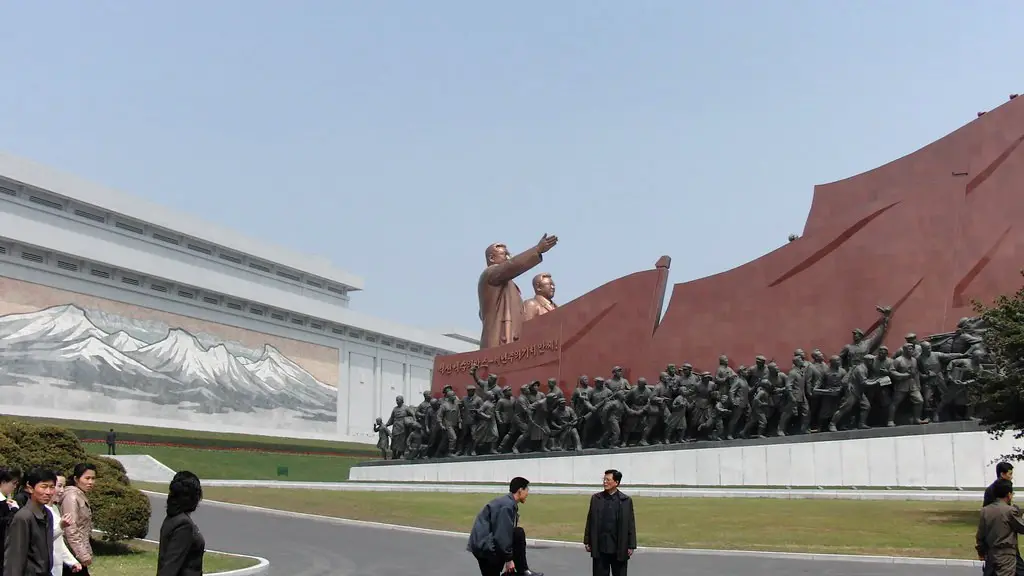History of North Korean Nuclear ambitions
North Korea’s erratic behavior and increasing nuclear capabilities have long been a cause for concern among world leaders. North Korea has had nuclear ambitions for decades, and its nuclear ambitions started in the late 1950s. It was then that North Korea began to develop its Baekdusan-2 nuclear program, which was quietly conducted in the background until the 1980s. In the mid-1980s, it was believed that Pyongyang was actively trying to build its own nuclear reactor, and in the early 1990s, it appeared that North Korea had begun to purchase nuclear-related materials in an attempt to build a plutonium-based nuclear weapon.
Nuclear Test
By the end of 2006, North Korea had conducted its first successful nuclear test. This test, which was conducted in an underground facility, immediately caused world leaders to rally together and impose sanctions on the country. Subsequent nuclear tests by North Korea were met with the same reaction, and in 2018, it was thought that the North Korean government had acquired the capacity to launch intercontinental nuclear weapons. While the North Korean government has never confirmed the exact capability of their arsenal, there are some estimates that the country has up to 8 nuclear weapons.
The International Response
The international community has responded to North Korea’s nuclear weapons program in various ways. On one hand, the United Nations has passed multiple resolutions in an effort to counter North Korean activities, and these resolutions have included economic sanctions. On the other hand, various nations have held negotiations with North Korea in an effort to reach a denuclearization agreement. In recent months, talks have been ongoing between the United States and North Korea, yet all sides have been unable to reach a successful denuclearization agreement.
Longstanding Brinkmanship
Since the beginning of its nuclear activities, North Korea has engaged in a policy of brinkmanship in order to influence world leaders. This policy has included explicit nuclear threats, such as the alleged hydrogen bomb test conducted in 2017, as well as more subtle measures, such as pressuring other nations through military exercises. North Korea also has an extensive arsenal of conventional weapons, and it is believed that these weapons are often used as leverage in negotiations with the international community.
The Risk of War
Despite the increasing tensions between North Korea and the international community, many analysts believe that a full-scale war between the two is unlikely. This is due to the fact that both sides have much to lose if open hostilities were to break out, and many consider the current level of tension to be simply a cold war between the two sides. However, the possibility of a miscalculation cannot be disregarded, and there is always the risk of an escalation of the current situation that could have devastating consequences for both sides.
The Humanitarian Situation
Although much of the attention surrounding North Korea has focused on its nuclear weapons program, it is important to remember that this is just one aspect of a much larger humanitarian crisis. North Korea has been under the rule of a repressive regime for decades, and numerous human rights violations have taken place in the country. This is due in part to the severe economic sanctions that have been imposed on the nation, as well as the heavy-handed tactics used to repress dissent.
Expanding Influence
North Korea has grown increasingly bold and ambitious in the last few years, and the country has started to spread its influence in the region. Through its nuclear program, North Korea has been able to become a regional leader, and it has started to engage with other nations in the region. Some analysts believe that North Korea’s nuclear weapons program is a sign of the country’s increasing assertiveness, and others have pointed out that it has allowed the nation to have a greater say in regional and global affairs.
The Iranian Connection
Up until recently, North Korea has been largely isolated from the international community, but that has begun to change in recent years. This is due in part to the establishment of ties between North Korea and Iran, which is one of the few countries that have nuclear weapons. The relationship between the two countries has been further strengthened by the US withdrawal from the Iran nuclear deal, and there is some speculation that the two countries are now supporting each other’s nuclear programs.
Military Capabilities
To date, North Korea has primarily relied on its nuclear weapons capabilities as a means of deterrence, but the country has also been quietly developing its conventional military capabilities. North Korea is thought to possess one of the largest standing armies in the world and its military equipment is relatively advanced. North Korea has also been developing its missile program, which will likely become a much more prominent player in the geopolitical landscape in the near future.
The Future of North Korea
It is difficult to predict what the future holds in store for North Korea, but one thing is certain: its nuclear weapons program will remain a major source of tension in the international community. While it is possible that negotiations between the United States and North Korea will eventually lead to an agreement that limits the country’s nuclear capabilities, it is also possible that North Korea will continue to arm itself with nuclear weapons and pursue a more aggressive policy in the region.


